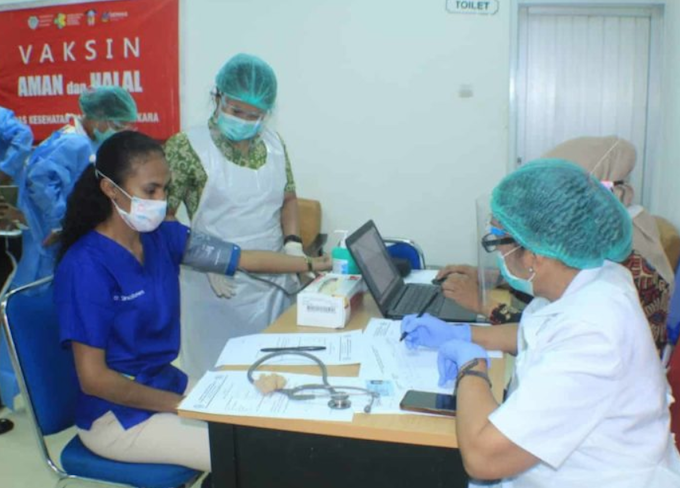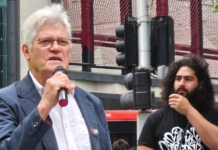
By Hengky Yeimo in Jayapura
Local governments in Papua — such as the Yapen Islands and Puncak administrations — say they are continuing to promote the benefits of covid-19 vaccines to indigenous Papuans as hoaxes and distrust from local people towards the Indonesian government has increased low vaccination rates.
Head of Yapen Islands Health Agency, Karolus Taniwani, has appealed to the public to get vaccinated, showing himself and other Yapen Islands officials who have been vaccinated as evidence that the vaccine is safe.
“Those of us who have been vaccinated are in good health. I invite all people in the Yapen Islands Regency to take part in the covid-19 vaccination,” Taniwani told Jubi by phone.
- READ MORE: Covid-19 vaccination for health workers in Papua runs at slow pace
- Other West Papua covid crisis reports
Taniwani also recounted his own experience of getting vaccinated. He said he got sick following the vaccination but immediately saw the doctor in the hospital for examination.
It turned out the illness was caused by relapsing malaria. Amid the covid-19 pandemic, the Papuan people are still vulnerable to other diseases such as malaria, HIV, and hepatitis.
Coordinator of the Yapen Islands Covid-19 Task Force, Erny Renny Tania, said her party continued to educate the people about the covid-19 pandemic, as well as the importance of adhering to the health protocols.
They did this by traveling around markets and villages by car and spreading information through loudspeakers.
Vaccine ‘not poison’
Puncak Health Agency head Demus Wonda said that the covid-19 vaccine was not poison.
“Drugs [vaccine] imported from outside Papua are not meant to kill the people but to strengthen the people through the formation of antibodies,” he said.
Taniwani echoed Wonda, saying that if it was true the covid-19 was ‘poison’, he would have died. But the fact is, he did not die after being vaccinated.
Fear that the government’s covid-19 vaccination programme would kill the Papuan people is not surprising as years of oppression, discrimination, murder, and imprisonment inflicted by the state against the Papuans have created a prolonged trauma among the people.
Benny Giay, chairman of the Kemah Injili Church Sinode of Papua, said that for the past two years, covid-19 had been used by the Indonesian Military (TNI) and police as an excuse to disperse Papuan people’s protests against racism and the continuation of the Special Autonomy (Otsus) Law.
“Those people whom the Papuan people highly distrust should not be involved in overseeing the vaccination,” Giay said, as quoted by Project Multatuli.
The Papuans, Giay said, saw the involvement of the army and police as “bad intentions” and refused to be vaccinated.
Distrust towards state
Audryne Karma, a dentist and daughter of Papuan political figure Filep Karma, also told Project Multatuli that the distrust from the Papuan people toward the government’s health programme was not only over covid-19 vaccinations.
Even before the pandemic, from Karma’s own experience at least, health programmes were, in the eyes of many Papuans, considered to carry a disguised mission to harm Papuans.
According to the head of Papua Health Agency, Roby Kayame, covid-19 vaccination in the province had only reached 190,723 people for first dosage, or 13.06 percent, and 12,911 people (5.58 percent) for the second dose. Most of them are non-Papuan people.
“The percentage of indigenous Papuans [who get vaccinated] is very small compared to non-Papuans in some places,” Kayame said.
Jayapura, Mimika, and Merauke are areas with high vaccination rates. On the other hand, vaccination rates are still low in the mountainous areas of Lapago and Meepago.
In the Saireri area, the vaccination rate in Biak Regency is much higher than Supiori, Yapen and Waropen. Vaccination rates in Boven, Mappi, and Asmat are considered high.
The Project Multatuli report also depicted the story of a mother of two in Wamena city, who was still in doubt about whether she would get the vaccine.
Fear over side effects
“Actually, I don’t really mind. But with a lot of information circulating, some say vaccines is good and others say it’s bad, with the side effects and all kinds of things,” she said.
“I have other disease, so this has also become my question. I prefer not to be vaccinated for fear that the side effects can be fatal,” she said.
She said she only obtained information about covid-19 and the vaccination programme through social media. The internet service in Wamena was very slow, making it difficult to find accurate information.
As for direct information, she only heard about the vaccination programme from the police car that going around the villages.
“Mostly, people are terrified by the effects of the vaccine,” she said.
“Indeed, from what I have seen, there has been no major dissemination about the various vaccines that have reached this small community.
“Which groups need vaccines? I don’t know myself. We have the right to know first, don’t we? So we can decide what to do.”
Her testimony shows that the low interest in vaccines is also due to the lack of information from government authorities.
Hengky Yeimo is a Tabloid Jubi reporter. Some information in this article is excerpted from an article written by Asrida Elisabeth for Project Multatuli. The article is republished by Asia Pacific Report with permission.











































